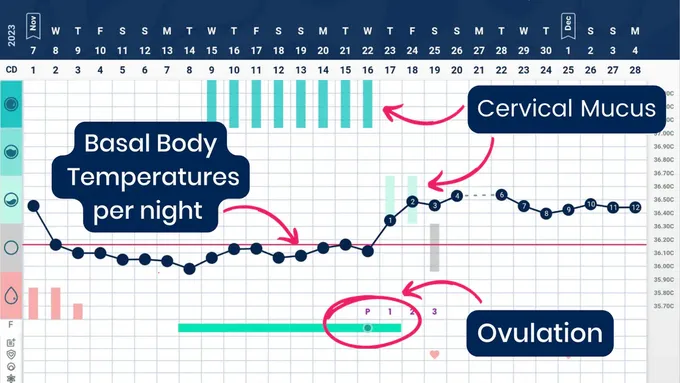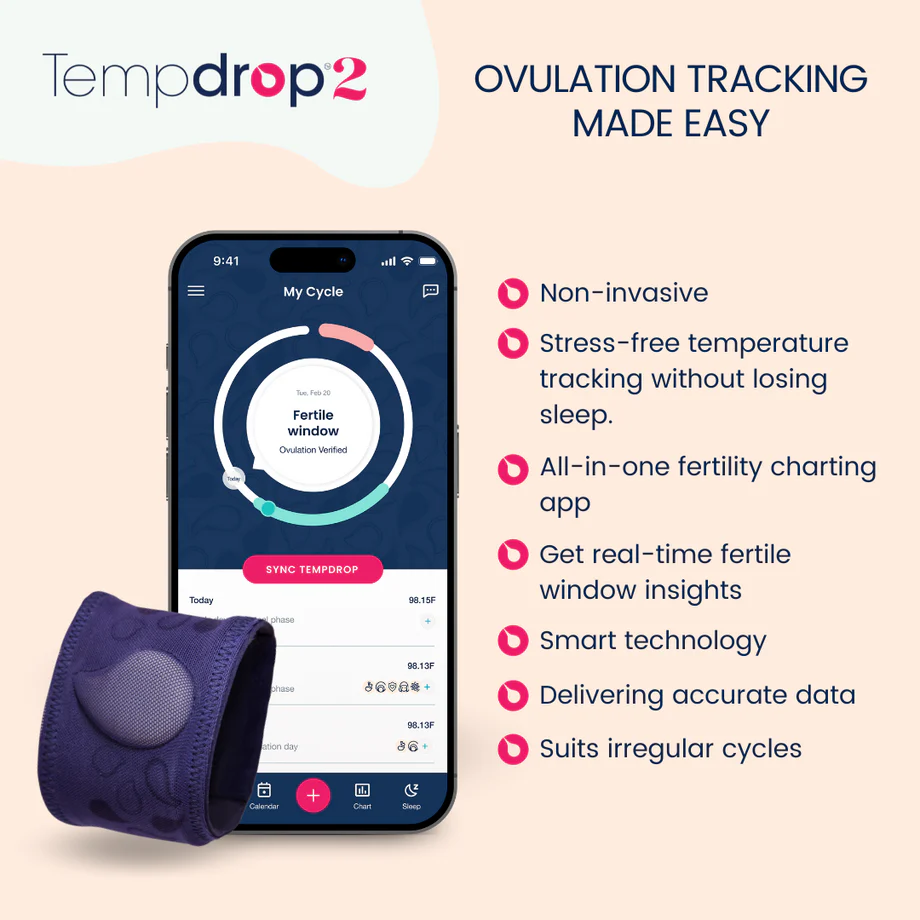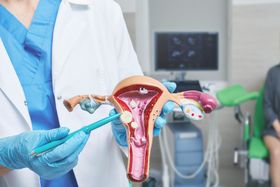Hypothyroidism & Fertility: The Impact on Reproductive Health
Updated July 7, 2025

Hypothyroidism is a health condition where the thyroid gland—a gland at the back of the throat—doesn't produce enough hormones. These hormones are essential messengers that relay information to the organs and tissues of the body, controlling various functions, including metabolism, heart rate, and basal body temperature (BBT).
The condition went from affecting 9.5% to 11.7% of people between 2012 and 2019 in the United States. Despite hypothyroidism's prevalence among older adults, it has a significant impact on reproductive health because the thyroid forms part of the endocrine system—a gland network that produces hormones.
We spoke to Natasha Hogan—a healthcare professional and author of Pregnancy After Infertility: A Guide to What's Next & What's Different—to gain valuable insight into hypothyroidism and its impact on fertility and reproductive health.
Hypothyroidism: Causes & Symptoms
Hypothyroidism can stem from two main issues:
- Iodine deficiency: Low iodine can be damaging to thyroid hormone production and reproductive health.
- Hashimoto's disease: This autoimmune disease causes the immune system to mistakenly attack and destroy the tissues of the thyroid gland.
Some signs of hypothyroidism include constipation, dry skin, and unexplained weight gain.
In relation to the two conditions that can cause hypothyroidism, some specific symptoms are:
- "Iodine deficiency's signs are less obvious and often lead to misdiagnoses," says Hogan. When severe, a goiter (enlarged thyroid gland that forms a noticeable lump in the neck) can develop.
- Hashimoto's disease can cause fatigue, cold intolerance, and joint and muscle pain.
Hypothyroidism & Ovulation
Hypothyroidism can significantly impact fertility by causing irregular menstrual cycles and often leading to heavier menstruation. This irregularity can disrupt the usual patterns of the menstrual cycle, including the luteal phase which follows ovulation and precedes menstrual bleeding.
Some ways hypothyroidism affects ovulation are:
- Hormonal imbalances: Low progesterone levels and irregular periods (for instance, every 6 months or longer) can lead to nutrient deficiencies, particularly zinc and iron, which can cause fatigue and harm fertility.
- Ovarian cysts: Hypothyroidism and ovarian cysts correlate. Because hypothyroidism can interfere with sex hormones, cysts can form that cause irregular ovulation.
- Trouble determining ovulation: In a regular cycle, most women ovulate around day 14. But with prolonged bleeding and irregular cycles, ovulation can be delayed until between days 16 and 21, leading to a shorter luteal phase. So, pinpointing the best time to conceive can be challenging.
- Metabolic issues: These can affect the BBT, which is often used for fertility tracking. Hypothyroidism makes it difficult to measure this temperature increase indicative of ovulation.
- Hyperprolactinemia or high prolactin levels: The prolactin hormone impacts menstruation and fertility. When levels are elevated, it can lead to irregular menstrual cycles, decreased fertility, and lactation of milk production in the breasts unrelated to pregnancy.
Those experiencing symptoms of hypothyroidism or who have a family history of the condition should start monitoring their cervical mucus and doing BBT tracking within the first six months of trying to conceive as these are easier to maintain and more affordable than ovulation tests.
"Tracking hypothyroidism can indicate poor BBT and ovulation. These indications can help doctors determine the right tests to run, as hyperthyroidism and hypothyroidism have different impacts on fertility and require different treatment approaches," explains Hogan.
Impact on Conception
Hypothyroidism and getting pregnant don't always mix well. The condition can interfere with both fertilization and implantation, posing challenges to conception.
Some complications include:
- Delays in natural conception for those quitting birth control
- Heavy bleeding, leading to increased sick days and discomfort
- Vaginal dryness, which can make conceiving difficult due to reduced natural lubrication
- Low testosterone levels in men, reducing sexual drive and sperm functionality
- Unsuccessful egg attachment to the womb due to insufficient estrogen levels
- Weak placenta formation
Does Hypothyroidism Cause Infertility?
In short, yes. But are you wondering how thyroid issues can cause infertility? When thyroxine levels are low and body functions are slower due to an underactive thyroid, the placenta can be compromised from implantation. Therefore, pregnancy may not take, even after an embryo is developed. So overall, reproductive wellness can be affected.
» Find out how to recognize happy and healthy hormones with charting
Impact on Pregnancy
Even while pregnant, hypothyroidism can cause complications. Many of these extend past fertilization to the development of the embryo and the mother's health.
Some risks include:
- Miscarriage, especially around the 12-week mark
- Potentially compromised fetal brain development
- Preeclampsia (characterized by high blood pressure)
- Anemia
- Postpartum hemorrhage
- Muscle pain and weakness
- Congestive heart failure
- Thyroid effects on the uterus, such as the placenta prematurely separating from the uterus
- Heightened anxiety
"Despite the critical role that thyroid function plays in pregnancy, many people undergoing infertility treatment may not receive adequate education on the importance of these tests and why they're being done," says Hogan. "Hypothyroidism can affect not just physical health but also mood. This influence can extend to a child's development, implying a need for thyroid function evaluation if there are growth concerns."
Treatments to Help Improve Reproductive Health
With no definitive way to prevent hypothyroidism, early detection and management are key, particularly for individuals with a higher risk of thyroid problems due to a history of autoimmune diseases, radiation therapy in the neck, or certain medications.
Thyroid Medications
Any thyroid medication should be administered by a medical professional as each person's medical history can affect which medications are appropriate for them. Regular monitoring is important to ensure the correct dosage, avoid complications, and keep your healthcare provider informed of any side effects.
Some side effects occur when the medication leads to an overactive thyroid (hyperthyroidism). These include:
- Rapid heart rate
- Nervousness
- Irritability
"Despite potential side effects, maintaining appropriate thyroid hormone levels is important for the health of both the mother and baby," says Hogan.
Dietary Changes
Certain dietary changes can have potential benefits. For instance, adopting a plant-based diet can help with symptom alleviation as thyroid issues can exacerbate inflammatory responses in the body.
However, it is important to keep in mind that dietary changes may not necessarily resolve hypothyroidism completely, but they can potentially help manage symptoms.
Note: Regardless of the dietary approach, hypothyroidism should be managed and implemented under the guidance of a healthcare professional regularly.
Food & Supplements
Certain foods and supplements should be regulated due to their potential impact on thyroid function.
- Soy products and iron supplements can interfere with thyroid hormone absorption, particularly for those with an iodine deficiency.
- Kelp and other seaweeds with high amounts of iodine (Tip: iodine intake should be moderate even if you have a deficiency.)
- Certain vegetables—such as cauliflower, kale, and cabbage—contribute to goiter development when consumed in large quantities.
Emotional Support
By managing hypothyroidism, particularly because of decreased mood regulation, anxiety levels can be decreased. This is especially helpful for women who have undergone infertility treatments and are now pregnant.
Tip: "Women planning for pregnancy should be assessed for thyroid hormones and serum prolactin," advises Hogan. Untreated hypothyroidism during pregnancy can lead to various complications, including subfertility, fetal death, premature delivery, and spontaneous abortion.
» Want to know more? Discover the connection between ovulation and mental well-being
Take Charge of Your Fertility
"There is no sure-fire way to prevent hypothyroidism. But if early signs of the condition are detected, measures can be taken to prevent the disease from progressing," says Hogan. With this condition having a direct impact on ovulation, metabolism, conception, and healthy pregnancies, bolstering your fertility health is crucial.
This includes professional medical monitoring, hormone management, and dietary adjustments. But to start, you can better understand your body and how it reacts to hypothyroidism symptoms. With Tempdrop's hassle-free BBT monitoring armband and cycle charting app, you can learn your body's rhythms for more informed fertility planning.















